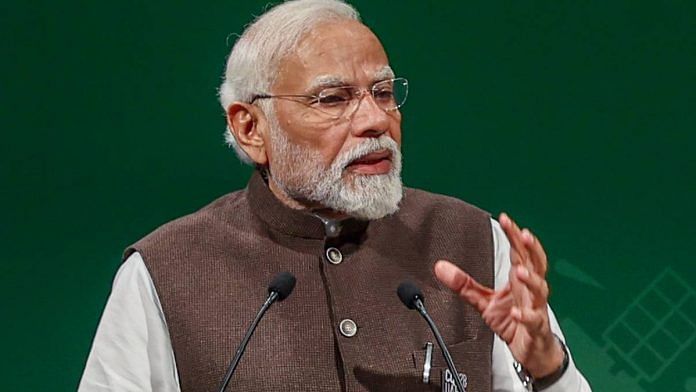New Delhi: India, along with China, abstained from signing the Global Renewables and Energy Efficiency Pledge, to which 118 countries around the world, including the US and UK, committed themselves Saturday at the COP28 climate summit in Dubai.
The pledge aimed to triple installed renewable energy capacity worldwide to at least 11,000 gigawatts (GW) by 2030. The initiative was led by the European Union, the UAE and the US. Brazil, Australia, and Canada were also among the 118 signatories to the pledge.
The draft text of the pledge, which has been accessed by ThePrint, calls for doubling the global average annual rate of energy efficiency improvements from around 2 percent to over 4 percent every year until 2030.
It also recognises that in order to meet the Paris Agreement goal of limiting the rise in temperature to 1.5 degrees Celsius above pre-industrial levels by the end of this century, “renewables deployment must be accompanied in this decade by a rapid increase of energy efficiency improvements and the phase down of unabated coal power”.
The text mentions the G20 New Delhi Leaders’ Declaration of September 2023, championed by host India, in which countries agreed to “pursue and encourage efforts to triple renewable energy capacity by 2030”.
India is currently the third-largest producer of renewable energy and has ambitious plans to increase its capacity. It has already announced its goal to have 500 GW of renewable energy capacity by 2030.
However, its decision to not sign the COP28 global pledge is likely related to the framing of the text.
“There is an oblique sense that the tripling of renewable energy must necessarily go together with the phasing out of coal,” Aarti Khosla, director of Climate Trends, a research-based consulting and capacity building initiative, said in a communication to the media Saturday. “India has defended its stance on coal, especially at COP28 where other large emitters like the US are still holding on to their gas expansion plans,” she added.
Also Read: In Delhi Declaration, G20 leaders pledge health systems ‘better than pre-pandemic levels’ in 2-3 yrs
Coal singled out
The first paragraph of the Global Renewables and Energy Efficiency Pledge underscores the need to make energy systems “free of unabated fossil fuels” by 2050. However, the text goes on to specify the phasedown of only one fossil fuel — coal.
Citing the International Energy Agency and the Intergovernmental Panel on Climate Change, the pledge calls for the “phasedown of unabated coal power” and ending investments in “unabated coal-fired power plants” by the end of this decade.
India, which relies on fossil fuels, mainly coal, for 75 per cent of its power generation, has previously protested against the specific focus on the phasedown of coal for climate change action.
At COP27 in Sharm-el-Sheikh in 2022, India sought to add “phasedown of all fossil fuels” as a goal for the participating countries, instead of just “phasedown of unabated coal power”. Other countries and the EU had agreed to India’s call, but the final COP27 text did not mention the phasedown of all fossil fuels.
Oil and gas expansion
A report published this September by Oil Change International, a research, communication, and advocacy organisation, said that five countries — the US, UK, Australia, Canada and Norway — were responsible for 51 percent of the planned expansion of new oil and gas fields through 2050.
These five were among 20 nations that could be responsible for nearly 90 percent of the carbon dioxide pollution threatened by new oil and gas fields and fracking wells planned between 2023 and 2050, according to the report.
If these countries proceed with their new extraction, committed carbon pollution will be 190 per cent over the 1.5 degrees Celsius budget, said the report.
Yet, oil and gas phasedowns have not been specifically mentioned in the draft text of the pledge at COP28.
“At COP28, a surge of declarations, notably the pledge to triple renewable energy by 2030, has sparked attention. However, these commitments fall short of the transformative ambition needed. The persistent expansion of fossil fuel production starkly contrasts with the urgency of our climate crisis,” Harjeet Singh, head of global political strategy at Climate Action Network International, told ThePrint Monday.
“Addressing climate change demands more than incremental steps; it requires a decisive shift away from fossil fuels — fast, fair and forever,” he urged.
(Edited by Nida Fatima Siddiqui)
Also Read: Climate protesters in Portugal storm building, urge minister to step down



